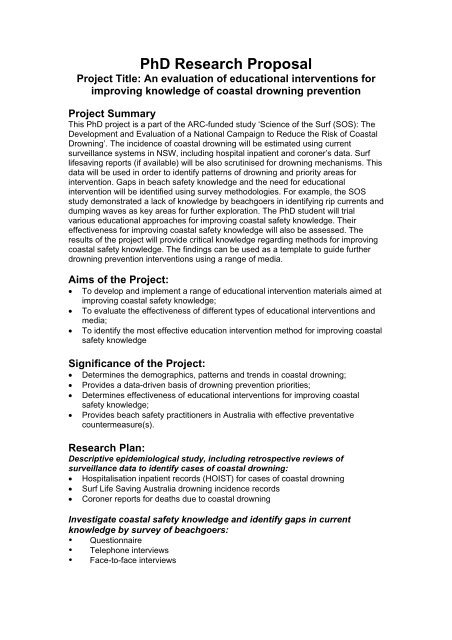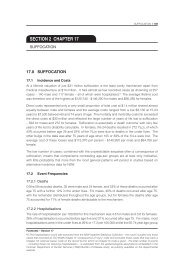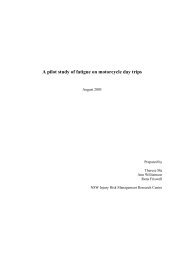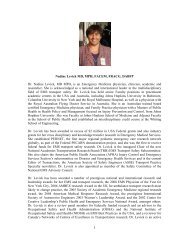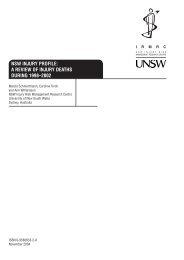PhD Research Proposal
PhD Research Proposal
PhD Research Proposal
You also want an ePaper? Increase the reach of your titles
YUMPU automatically turns print PDFs into web optimized ePapers that Google loves.
<strong>PhD</strong> <strong>Research</strong> <strong>Proposal</strong><br />
Project Title: An evaluation of educational interventions for<br />
improving knowledge of coastal drowning prevention<br />
Project Summary<br />
This <strong>PhD</strong> project is a part of the ARC-funded study ‘Science of the Surf (SOS): The<br />
Development and Evaluation of a National Campaign to Reduce the Risk of Coastal<br />
Drowning’. The incidence of coastal drowning will be estimated using current<br />
surveillance systems in NSW, including hospital inpatient and coroner’s data. Surf<br />
lifesaving reports (if available) will be also scrutinised for drowning mechanisms. This<br />
data will be used in order to identify patterns of drowning and priority areas for<br />
intervention. Gaps in beach safety knowledge and the need for educational<br />
intervention will be identified using survey methodologies. For example, the SOS<br />
study demonstrated a lack of knowledge by beachgoers in identifying rip currents and<br />
dumping waves as key areas for further exploration. The <strong>PhD</strong> student will trial<br />
various educational approaches for improving coastal safety knowledge. Their<br />
effectiveness for improving coastal safety knowledge will also be assessed. The<br />
results of the project will provide critical knowledge regarding methods for improving<br />
coastal safety knowledge. The findings can be used as a template to guide further<br />
drowning prevention interventions using a range of media.<br />
Aims of the Project:<br />
• To develop and implement a range of educational intervention materials aimed at<br />
improving coastal safety knowledge;<br />
• To evaluate the effectiveness of different types of educational interventions and<br />
media;<br />
• To identify the most effective education intervention method for improving coastal<br />
safety knowledge<br />
Significance of the Project:<br />
• Determines the demographics, patterns and trends in coastal drowning;<br />
• Provides a data-driven basis of drowning prevention priorities;<br />
• Determines effectiveness of educational interventions for improving coastal<br />
safety knowledge;<br />
• Provides beach safety practitioners in Australia with effective preventative<br />
countermeasure(s).<br />
<strong>Research</strong> Plan:<br />
Descriptive epidemiological study, including retrospective reviews of<br />
surveillance data to identify cases of coastal drowning:<br />
• Hospitalisation inpatient records (HOIST) for cases of coastal drowning<br />
• Surf Life Saving Australia drowning incidence records<br />
• Coroner reports for deaths due to coastal drowning<br />
Investigate coastal safety knowledge and identify gaps in current<br />
knowledge by survey of beachgoers:<br />
• Questionnaire<br />
• Telephone interviews<br />
• Face-to-face interviews
Review educational interventions which aim to improve coastal safety<br />
knowledge:<br />
• In Australia and overseas<br />
• Current vs. historical campaigns<br />
• Review any evidence of effectiveness<br />
Develop educational interventions using various media to address<br />
current gaps in coastal safety knowledge (subject to funding):<br />
• Poster<br />
• Brochure<br />
• Community seminars such as Rob Brander’s “Science of the Surf”<br />
• Public service announcement<br />
• Youtube<br />
• Television reality shows Bondi Rescue, Surf Patrol and Deadly Surf (Piha<br />
Rescue in NZ)<br />
Measure the effectiveness of educational interventions:<br />
• Conducted at coastal and non-costal areas<br />
• Targeting different age groups<br />
• Male vs. female<br />
• Domestic vs. international tourists<br />
Approximate schedule:<br />
July 08-Dec 09: Student commences, review of literature and epidemiologic data<br />
Jan 09-Nov 09: Develop education intervention methods, piloting materials<br />
Nov 09-Jan 10: Implement interventions and assess effectiveness<br />
Jan 10-Jul 10: Data analysis, further refinement of interventions<br />
Jul 10-Oct 10: Target priority areas/ages with revised interventions<br />
Nov 10-Jan 11: Assess effectiveness of intervention materials and methods<br />
Jan 11-June 11: Data analysis, report writing, dissemination of results<br />
Criteria:<br />
The successful <strong>PhD</strong> candidate will have a graduate degree in Behavioural Science or<br />
Public Health. The project would also suit someone with a background in Health<br />
Promotion or Education. An interest in beach safety would also be beneficial as<br />
would experience conducting evaluation studies.<br />
Please direct any inquiries to Dr Shauna Sherker (shauna.sherker@unsw.edu.au)


